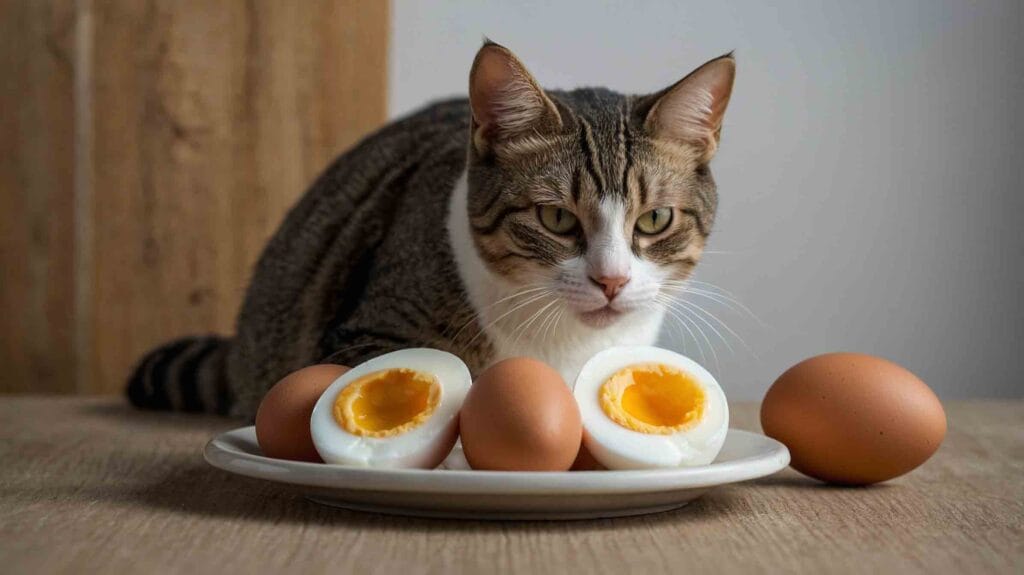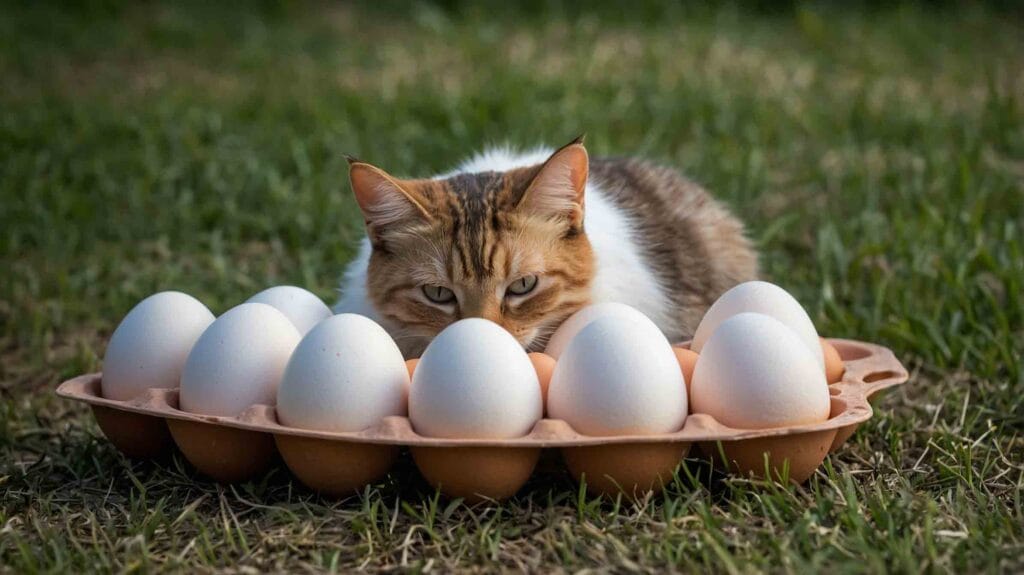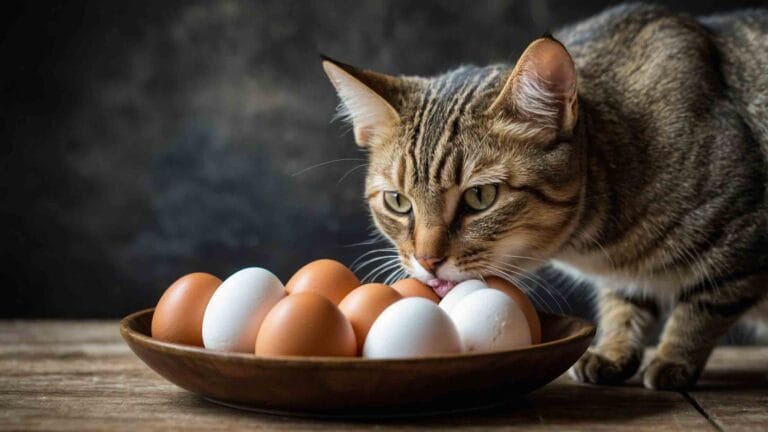Are you a cat lover? You have many doubts about cat’s food but particularly this one can cats eat eggs? Eaten throughout the world, eggs are a staple in many kitchens and boast a well known nutritional profile with a reputation for versatility.
But when it comes to cats, there’s always a special question: Can cats eat eggs?
Because of the nutrient profile of this food, many pet owners are wondering if their feline companion would be safe eating a little of it.
Eggs are generally safe for cats, with the exception of some we have to consider. But let’s crack open the facts behind this popular question.
Nutritional Value of Eggs
They’re high in nutrition, and eggs are powerful foods for cats and humans alike.
High quality protein and healthy fats are found in a single egg along with a number of vitamins and minerals. These nutrients include:
- Protein: Cats need a lot of animal based protein, and eggs are FULL of it, making it a great source of protein for our feline friends.
- Amino Acids: Eggs are a complete protein as they contain all nine essential amino acids that a cat’s body can’t produce, and so help with health in general.
- Vitamins and Minerals: If your cat is fed eggs occasionally they provide a number of vitamins all of A, B12, D and E as well as minerals such as iron and selenium that contribute to a cat’s immune system, vision and skin health.
As eggs contain high quality protein and amino acids, they can help keep cats muscles strong and make their coats healthy and shiny. eggs can be a valuable part of a cat’s diet in moderation.
Eggs for a Cat
Cats benefit from the high nutrient profile eggs have to offer. Some key benefits include:
- Improved Coat and Skin: Eggs will also help keep a cat’s coat soft and shining and promote healthy skin due to the protein and fatty acids they contain.
- Enhanced Muscle Growth: Without high quality protein, cats require for muscle maintenance and growth, she become weak and lethargic. The good thing about eggs is they are the perfect amount of protein to match these requirements.
- Boosted Immune System: Eggs provide vitamins and minerals that cats need to get a functional immune system and fight off infections and illnesses, such as the vitamins E and selenium.
Because of this, eggs can be a great, occasional food or supplement to your cat’s normal diet.
Can Cats Eat Raw Eggs?
Raw eggs might sound like a great idea to give your cat, but raw eggs are not a good idea for cats. There are a few key reasons for this:
- Bacterial Contamination: Salmonella or E. coli that can sicken both humans and cats can lurk inside raw eggs. This can cause gastrointestinal distress, vomiting and diarrhea.
- Biotin Deficiency: Avidin, a protein in raw egg whites, can block biotin, one of the B vitamins needed for healthy skin and metabolism. Avidin is rendered neutralized by cooking, but if raw eggs are eaten frequently enough, they will cause a biotin deficiency.
That said, it’s best not to go raw on the eggs, to keep your cat healthy and safe.
Cooked Eggs for Cats: What’s the benefit?
Raw eggs are much hazardous for cats than the cooked eggs. To avoid bacterial contamination, the egg is also cooked so that the avidin in egg whites is neutralized.

Not only do cooked eggs not lose their nutritional value, but they also contain healthy fats and essential vitamins and protein for your cat.
When preparing eggs for your cat, don’t add any seasoning oil or salt.
The simple way of scrambling, boiling or poaching the egg is the best, as these keep the nutrients of the egg intact without introducing harmful ingredients.
Also Read: Can Cats Eat Chocolate? is poisonous to cats
Eggs & Cats With Food Sensitivities
Generally speaking eggs are safe for the vast majority of cats, but occasionally some cats have food sensitivities and allergies that result in a negative reaction.
If you or your child experiences excessive scratching or skin irritation.
While eggs are generally safe for most cats, some cats may have food sensitivities or allergies that can cause adverse reactions.
Symptoms of egg intolerance in cats may include:
- Vomiting
- diarrhea
- Excessive scratching
- skin irritation
- Licking
- chewing on paws
If you think your cat is having an allergic reaction to eggs, stop giving them eggs and talk to your vet for advice.
If your cat suffers from allergies, it’s important to know that allergies to eggs are rare, but cats can have allergic reactions to them if they infrequently get food sensitivities.
Also Read: Can Cats Eat Cheese? A Complete Guide to Cats Safety
risk for cats eat eggs:
Cats should be fed eggs in moderation. If you use them occasionally as a treat or as a nutritional supplement they can be a very good thing, but they shouldn’t be a major part of a cat’s diet.
Here are some tips for incorporating eggs safely:
- Use eggs as a treat: a scrambled or boiled egg, once or twice a week, form a small part of a healthy supplement to your cat’s diet.
- Balance with other foods: It’s not the case that eggs always replace a complete and balanced cat food diet. Make sure your cat’s regular meals contain all the nutrients your cat requires to be healthy.
- Portion size: An occasional treat for a 10 pound (4.5 kg) cat is a small portion (about one-quarter to one-half an egg).
If you stick to these guidelines you can rest assured whilst feeding eggs to your cat that you are not overdoing it and causing any imbalance as well.
Also Read: Can Cats Drink Milk? Cats Idea – Best Vet Answer
Eggshells: Should You Feed Them to Cats?
Is it safe to feed eggshells to cats? Some cat owners want to know.
Eggshells are high in calcium, which we recommend consuming in moderation for bone health, but you can use them as a supplement too.
Here are a few things to consider:
- Crush the eggshells: Make sure you ground the eggshells very fine to avoid choking hazards or digestive irritation.
- Not a substitute for cat food: Egg shells can offer calcium, but eggs should never negate the need for a whole, balanced fare for your cat that includes all trace minerals and vitamins.
- Consult your vet: However, before you start adding eggshells to your cat’s food regularly, it’s best to speak with your vet to make sure it’s appropriate and safe for your cat’s special nutritional needs.
Eggshells can be prepared correctly, and they can be a supplemental source of calcium in your cat’s diet.
Also Read: Why Do Cats Knead? Cats Idea – Vets best answer
Can Eggs Replace Cat Food?
The health benefits of eggs notwithstanding, they can in no way replace canned or dry cat food. Eggs alone cannot provide the things cats need in a well balanced diet such as taurine, arachidonic acid, and vitamin A.

Although eggs are a good supplement or occasional treat, they don’t make up a complete diet for your cat.
When you feed your cat with a nutritionally complete, balanced cat food you’re sending them those exact quantities of protein, vitamins, minerals, and so on that they require for good health.
Also Read: Why Do Cats Purr? – Best Vet Research – Cats idea
Facts and Common myths about Cats eating Eggs
Cats can eat an unlimited number of eggs without any problem he said.
several misconceptions surrounding the idea of feeding eggs to cats, such as:
- “Cats can eat unlimited eggs without any issues.” Eggs are nutritious, but too much of a good thing is not good, so only give in moderation when part of a balanced diet.
- The healthier option for cats are raw eggs over cooked eggs, for instance. everal misconceptions surrounding the idea of feeding eggs to cats, such as:
- Cats can eat unlimited eggs without any issues. While eggs are nutritious they should only be given in moderation as part of a balanced diet.
- Raw eggs are healthier than cooked eggs for cats. Raw eggs are dangerous for this reason: they can give your cat a biotin deficiency or bacterial infection.
Regardless of that, it’s important to separate fact from fiction, and never forget the health and safety of your cat.
wrap up on can cats eat eggs?
In short, eggs are fine for cats if, and only if, you prepare and give them properly. They provide your cat with high quality protein, essential amino acids as well as beneficial vitamins and minerals to support your cat’s overall health.
They are sources of high quality protein and are high in nutrients like B vitamins, including riboflavin that’s found in egg yolk as well as choline, a new nutrient for which it’s lacking in many Americans’ diets.
If your cat has any food sensitives or allergies, pay very closely to watch how they react to eggs and talk to your vet if you notice any problem symptoms after eggs.
They will be in charge of safe feeding practices.
The truth is eggs can be a healthy and tasty alternative to your cat’s diet.
Also Read: 4 Easy Homemade Cat Food Recipes for Healthy Cats
FAQ: can cats eat eggs?
q1: can cats eat scrambled eggs?
Ans: Cats can take fried eggs occasionally but they should not be embedding oil or butter on it, and also should not be seasoned, because it has a bad effect on the cats. These eggs should be well done in order to eliminate bacterial growth on the surfaces of the eggs.
q2: can cats eat fried eggs?
Ans: Cats can take fried eggs occasionally but it should not be embedding oil or butter on it, and also should not be seasoned, because it has bad effect on the cats. These eggs should be well done in order to eliminate bacterial growth on the surfaces of the eggs.
q3: can cats eat cooked eggs?
Ans: Cooked eggs are good to eat by cats but only in moderation. Protein and required nutrients in the eggs will not harm your cat. Cook the eggs fully; raw eggs can also be a health risk. Do not add seasonings, salt or butter. First, always consult your vet.
Q4: how much egg can I give my cat?
Ans: An occasional treat for cats yes cooked egg is safe for them to eat. Eat no fat plain, cooked eggs (boiled or scrambled). For most cats a teaspoon of egg will be fine. Always check with your vet before introducing new foods.
q5: how to cook an egg for a cat?
Ans: Cooking an egg for a cat, keep it simple. Choose whatever you prefer, just don’t scramble or boil the egg with salt or oil or seasonings. Make sure it’s completely cooked to keep out bacteria, such as salmonella. Serve the egg cooled, and a small portion is a treat.
q6: can kittens eat eggs?
Ans: While kittens can eat eggs, in moderation, they must be cooked all the way through to avoid having them be the next Halloween horror featuring a salmonella or bacteria scare. Although eggs are high in protein, don’t let them be the only thing your kitten eats.
